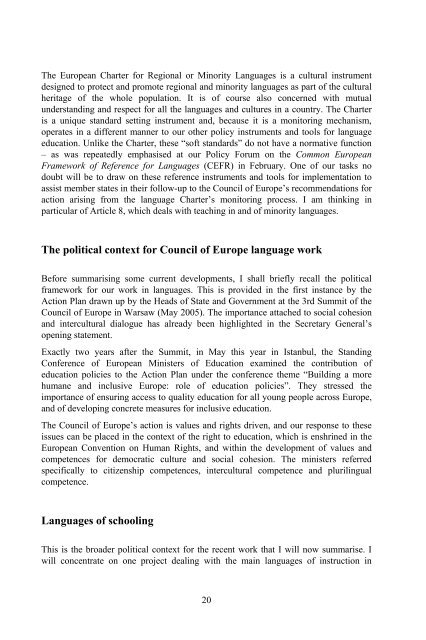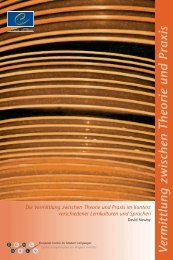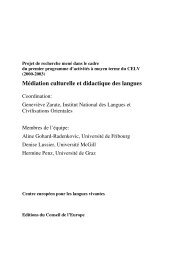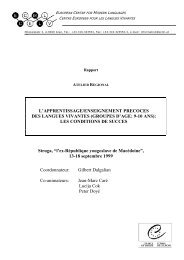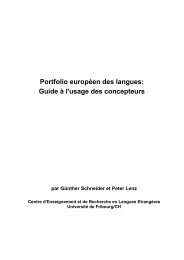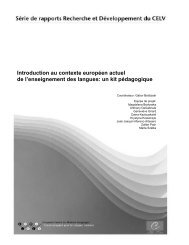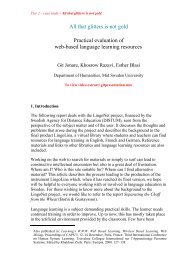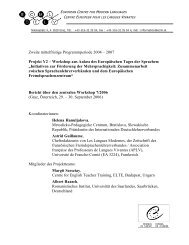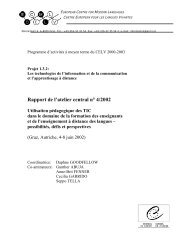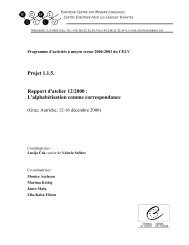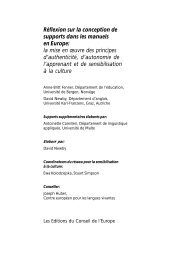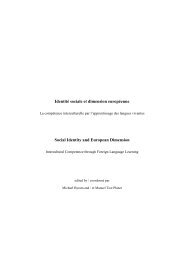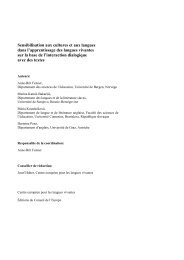cohesion - European Centre for Modern Languages
cohesion - European Centre for Modern Languages
cohesion - European Centre for Modern Languages
You also want an ePaper? Increase the reach of your titles
YUMPU automatically turns print PDFs into web optimized ePapers that Google loves.
The <strong>European</strong> Charter <strong>for</strong> Regional or Minority <strong>Languages</strong> is a cultural instrument<br />
designed to protect and promote regional and minority languages as part of the cultural<br />
heritage of the whole population. It is of course also concerned with mutual<br />
understanding and respect <strong>for</strong> all the languages and cultures in a country. The Charter<br />
is a unique standard setting instrument and, because it is a monitoring mechanism,<br />
operates in a different manner to our other policy instruments and tools <strong>for</strong> language<br />
education. Unlike the Charter, these “soft standards” do not have a normative function<br />
– as was repeatedly emphasised at our Policy Forum on the Common <strong>European</strong><br />
Framework of Reference <strong>for</strong> <strong>Languages</strong> (CEFR) in February. One of our tasks no<br />
doubt will be to draw on these reference instruments and tools <strong>for</strong> implementation to<br />
assist member states in their follow-up to the Council of Europe’s recommendations <strong>for</strong><br />
action arising from the language Charter’s monitoring process. I am thinking in<br />
particular of Article 8, which deals with teaching in and of minority languages.<br />
The political context <strong>for</strong> Council of Europe language work<br />
Be<strong>for</strong>e summarising some current developments, I shall briefly recall the political<br />
framework <strong>for</strong> our work in languages. This is provided in the first instance by the<br />
Action Plan drawn up by the Heads of State and Government at the 3rd Summit of the<br />
Council of Europe in Warsaw (May 2005). The importance attached to social <strong>cohesion</strong><br />
and intercultural dialogue has already been highlighted in the Secretary General’s<br />
opening statement.<br />
Exactly two years after the Summit, in May this year in Istanbul, the Standing<br />
Conference of <strong>European</strong> Ministers of Education examined the contribution of<br />
education policies to the Action Plan under the conference theme “Building a more<br />
humane and inclusive Europe: role of education policies”. They stressed the<br />
importance of ensuring access to quality education <strong>for</strong> all young people across Europe,<br />
and of developing concrete measures <strong>for</strong> inclusive education.<br />
The Council of Europe’s action is values and rights driven, and our response to these<br />
issues can be placed in the context of the right to education, which is enshrined in the<br />
<strong>European</strong> Convention on Human Rights, and within the development of values and<br />
competences <strong>for</strong> democratic culture and social <strong>cohesion</strong>. The ministers referred<br />
specifically to citizenship competences, intercultural competence and plurilingual<br />
competence.<br />
<strong>Languages</strong> of schooling<br />
This is the broader political context <strong>for</strong> the recent work that I will now summarise. I<br />
will concentrate on one project dealing with the main languages of instruction in<br />
20


